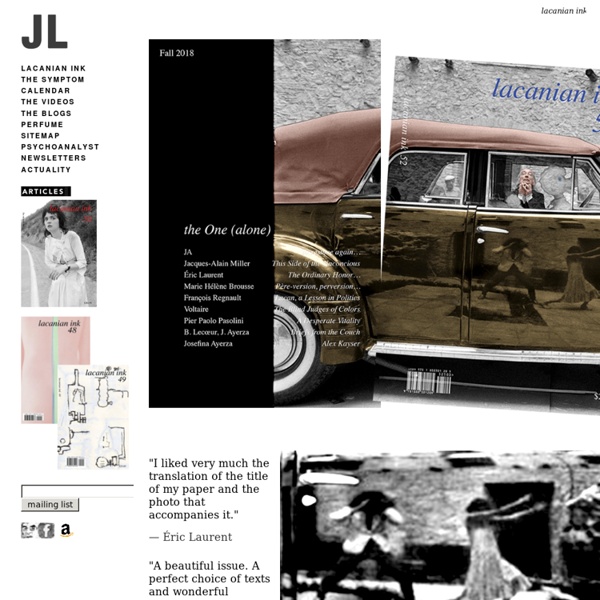



http://www.lacan.com/lacan1.htm
Related: humanitiesContents of Classical Christian Homeschooling: Classical Education at Home Introduction to Classical Education What classical education is, and why anyone would want to return to this style of teaching and learning. Ancient Egyptian painted limestone from 1340 BC of Imeneminet and his wife, Tahka. On display with the Egyptian Antiquities Collection, Louvre Museum in Paris. Département de Psychanalyse - Paris 8 L’UFR SEPF regroupe 3 départements : Sciences de l’éducation, Psychanalyse, Communication/Français Langue Etrangère. Chaque département a son identité institutionnelle propre et bien affirmée. Les deux premiers sont diplômants et s’appuient sur deux équipes de recherches constituées. Dr. Don Felix Sarda Y Salvany Liberalism is the root of heresy, the tree of evil in whose branches all the harpies of infidelity find ample shelter; it is today the evil of all evils. (Ch. 4). "The theater, literature, public and private morals are all saturated with obscenity and impurity.
Illich: Tools for Conviviality Tools for Conviviality Ivan Illich Contents Acknowledgments xix Introduction xxi I Two Watersheds 1 Biblical Greek: Learning New Testament and Septuagint Greek contents | little greek | textbooks | reading | greek NTs | dictionaries | grammars | cheating ἐξίσταντο δὲ πάντες καὶ διηποροῦντο, ἄλλος πρὸς ἄλλον λέγοντες, τί θέλει τοῦτο εἶναι; (Acts 2:12) This page contains information on resources for learning Greek. It is maintained by Jonathan Robie. Make sure you check out Little Greek 101, our online New Testament Greek tutorial.
Internet History Sourcebooks Project Internet History Sourcebooks Project Paul Halsall, Editor Last Modified: Dec 11 | linked pages may have been updated more recently The Internet History Sourcebooks Project is a collection of public domain and copy-permitted historical texts presented cleanly (without advertising or excessive layout) for educational use. 1. University of Glasgow Following the launch of the Shestov Studies Society, the first issue of the Shestov Journal came out in 1997, as a bi-lingual (English/ French) publication, that combined the informative role of a newsletter and the wider scope of a magazine devoted to the publication of new critical work as well as to the occasional re-printing of significant exegeses, or even primary texts which are long out of print. So far, five issues of the Shestov journal have been published : Issue nr. 4-5 is devoted to Shestov's previously unpublished correspondence with Martin Buber. Issue nr. 6 includes the reprint of the article 'Menacing Barbarians of Today', which initially came out in 1934 in the theosophical journal The Aryan Path, and which has never been reprinted in a volume.
Lev Shestov - Dostoevsky, Tolstoy and Nietzsche - ToC THE GOOD IN THE TEACHING OF TOLSTOY AND NIETZSCHEPhilosophy and Preaching Preface Chapters 1 2 3 4 5 6 7 8 9 10 11 12 13 14 15 Harvest of Grapes – Writings of Connor Creegan 1. The tone of this series doesn’t merit a formal introduction as I would include in an essay or some other form of biographical writing. Instead, I will briefly preface this article with some cursory information about what this series is, my intent in publishing it, and a few other necessary prerequisites. 2. “WIDTPTW” is an abbreviation of “What I Did to Prepare This Week”. Hence “WIDTPTW1” refers to my first documented week, “WIDTPTW2” refers to my second, and so on.
Rationality: From AI to Zombies - Lesswrongwiki Ebook cover image. Rationality: From AI to Zombies is a 2015 ebook by Eliezer Yudkowsky on human rationality and irrationality in cognitive science. The ebook can be downloaded on a "pay-what-you-want" basis from intelligence.org or viewed on the website readthesequences.com It is an edited and reorganized version of the Sequences, a series of blog posts published to Less Wrong and Overcoming Bias between 2006 and 2009. Rationality: From AI to Zombies serves as a long-form introduction to formative ideas behind Less Wrong, the Machine Intelligence Research Institute, the Center for Applied Rationality, and substantial parts of the effective altruism community. Contents The ebook's contents are organized into six books, containing a total of 333 essays from the Sequences.